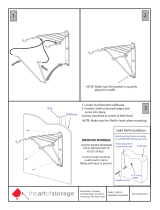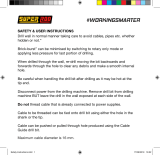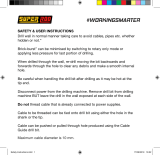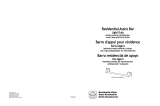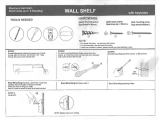
CP11626
07/04/13
©2013 Liberty Hardware Manufacturing Corporaon, A MASCO COMPANY
140 Business Park Drive • Winston-Salem, NC 27107
www.libertyhardware.com • Made in China/Hecho en China/Fabriqué Chine
1-800-542-3789
Safety Bar Installaon Instrucons
CAUTION AND SAFETY WARNINGS:
• DO NOT install this product without first reading and understanding this instrucon sheet. If you are unable to understand these Warnings and Instrucons,
contact a professional or technical personnel for assistance before aempng to install this product - otherwise, injury may occur.
• Aer ANY adjustments, repair or service and BEFORE use, make sure that all aaching hardware is ghtened securely.
• Assist Bars add security for bath and commode areas if aached as instructed. Locaon, size, and angle of bars should be determined by a qualified
professional to provide opmum safety and funcon.
• Use EXTREME cauon on wet tub or floor surfaces.
• Users with limited physical capabilies should be supervised or assisted in bath and commode areas, even when using Assist Bars.
• This Assist Bar can provide support and increased stability for an individual weighing up to 300 pounds. Assist Bars are NOT designed to support the total
weight of an individual. Use the bar for assistance ONLY.
• Be sure Assist Bars are correctly and securely installed. NEVER use Assist Bars if any looseness is noted.
• (For Anchor Mount) DO NOT install supplied wall anchors into wallboard less than 1/2” or greater than 2 1/2” thick.
• (For Anchor Mount) DO NOT install supplied wall anchors into wallboard that has been subjected to water damage or decay.
• (For Anchor Mount) DO NOT install supplied wall anchors into a wood stud.
• Locate studs prior to drilling. Determine if plumbing, electrical or other obstrucons, i.e. beads of adhesive ribbing, as in some tub surrounds, are contained
behind the wall.
• If mounng to an uneven surface, use silicone to fill any gaps between surface and mounng plate
• Apply a bead of silicone sealant designed for wet applicators to the back face of both assist bar mounng flanges. This will prevent water from bleeding
through the mounng holes potenally damaging the wall board.
PARTS SUPPLIED:
• (4) 1/4-inch x 2-1/2 Hex Head Lag Screws
• (4) Wall Anchors
• (4) 1/4-20 x 3” Machine Screws
Fig. 1
Fig. 2
Fig. 3
Fig. 4
Fig. 5
Phillips Screw Driver
Safety glasses
Pencil
Drill
1-inch Drill Bit
3/16-inch Drill Bit
Stud Finder
1-inch Carbide Tip Drill Bit
5/16-inch Carbide Tip Drill Bit
3/8-inch Drive Ratchet
THE FOLLOWING STEPS REQUIRE DRILLING INTO THE WALL.
When drilling into the wall, exercise care to avoid any electrical wiring
or plumbing that may be located behind the wall. Damaged electrical
wiring can cause electrical shock and/or fire. Since older homes do not
always fall in line with current housing codes and requirements, know
where internal wall wiring is located so that no wires will interfere with
your installaon.
PROPER INSTALLATION IS EXTREMELY IMPORTANT. IF IN
DOUBT, INSTALLATION SHOULD BE DONE BY A QUALIFIED
PROFESSIONAL.
TOOLS REQUIRED:
• 3/8-inch Power Drill
• 1-inch drill bit or hole saw (carbide p bit for hard surfaces like Ceramic Tile.)
• 3/16-inch Drill Bit (to drill pilot hole for installaon of Lag screw into wood wall stud)
• 5/16-inch Carbide Tip Drill Bit (if drilling through ceramic le)
• 7/16-inch HEX Socket with 3/8-inch Drive Ratchet
• #2 Phillips screwdriver
• Stud finder
• Pencil
• Safety glasses
ANCHOR REQUIREMENTS:
Requires a 3 1/2” space behind the wall and works in the following substrates:
• 1/2” or 5/8” Drywall (ONLY use on 5/8” drywall for commercial applicaons)
• 1/2” or 5/8” Drywall with Tile
• 1/2” or 5/8” Drywall wit Marble/Stone
BEFORE INSTALLING GRAB BAR:
IMPORTANT:
The recommended mounng method for assist bars is to mount at least one end of the bar into a
WOOD wall stud or WOOD blocking.
1. Remove the parts and products from the package.
2. Locate wood wall stud(s) in a corner or wood supports.
3. Place Assist Bar on wood stud at desired posion. (Ideal for corner placement.)
4. Mark the (4) mounng hole locaons from the shelf support bracket to the wall. If installing over
ceramic les, place masking tape on the mounng area before marking the hole locaon. (Fig. 1)
STUD-MOUNTING DIRECTIONS:
5. Put on safety glasses before starng.
6. Use the 3/8-inch power drill and 7/64-inch drill bit to drill all holes into the wall and wood wall
stud(s) at the marked posions. NOTE: If installing Grab Bar over ceramic les, the 1/4-inch carbide p
drill bit will be needed for drilling through the le, in order to prevent damage to the les. Drill pilot
holes through the les by using a 1/4-inch carbide p drill bit. Once a hole has been drilled through the
ceramic les, use the 7/64-inch drill bit to drill a pilot hole in the wood wall stud itself.
7. Aach Assist Bar mounng bracket to the wall with 1/4-inch x 2-1/2 Hex head lag screw.
8. Repeat on opposing side of wall. Then ghten securely.
9. Aach plasc shelf onto shelf bracket and ensure the plasc pegs snap into the holes on the
support bracket.
(Fig. 5)
NON-STUD MOUNTING DIRECTIONS:
5. Put on safety glasses before starng.
6. Use the 3/8-inch power drill and the 1-inch drill bit or hole saw to drill a one-inch hole precisely at
each of the marked posions from the previous step. NOTE: If installing Assist Bar over ceramic les,
the 5/16-inch carbide p drill bit will be needed for drilling through the le.
7. Clean the wall surface of any dust or debris.
8. Peel and remove (2) pieces of protecve strips from both pieces of tape on the supplied wall anchor
brace bar. The tape is necessary to allow the supplied wall anchor brace bar to adhere to the back side
of the wall for placement. (This will ensure that the bar will stay upright during installaon.
9. Get supplied Anchor, flip the bar downward at the end of the arm. The bar should be lted up only
slightly. (Fig. 2)
10. Hold the flange of the supplied anchor and insert the bar into the wall. The bar should have the
“UP” arrow poinng upward when installing into the wall.
11. Once the bar is completely inside the wall, pull outward/back on the flange and ensure the bar lts
upward behind the wall and straightens upright. The bar should be resng on the back side of the wall
and poinng upward with the longest side at the top. (Fig. 3)
12. Hold on ghtly to the flange and keep pressure on the bar behind the wall to ensure that the bar
stays upright with the longest part of the bar poinng upward. The bar behind the wall must always be
upright and the longest part must be poinng upward for the anchor to perform properly.
13. As you hold the flange and apply pressure to the bar by pulling outward, insert a 3” machine screw
into the hole of the Assist Bar Shelf bracket and then the center hole of the flange. Next align the
machine screw with the threaded insert in the bar and ghten enough to keep the bar upright. DO NOT
COMPLETELY TIGHTEN. (Fig. 4)
14. Repeat the previous steps 9-14 for the remaining three remaining anchors.
15. Turn and completely ghten the screws while applying pressure to keep the bar upright. Tighten
the screws unl the flange plate is flush against the wall and is secure.
16. Aach plasc shelf onto shelf bracket and ensure the plasc pegs snap into the holes on the
support bracket. (Fig. 5)
ASSIST BAR MAY NOT PROVIDE DESIGNED AMOUNT OF
SUPPORT UNLESS THESE INSTALLATION INSTRUCTIONS ARE
STRICTLY FOLLOWED.
For proper installaon, at least one end of Assist Bar MUST be posioned
over a wall stud. For solid support, both fasteners MUST go through the
wallboard or le to be ghtly secured into wall stud. Assist bar may be
installed vercally, horizontally or at an angle, so the mounng screw on
one end of the Assist Bar is secured into a wall stud. Locate the wall stud(s)
behind the wall before beginning installaon (a stud finder can be obtained
from a hardware store).
Flange
Drywall
Page is loading ...
Page is loading ...
/
